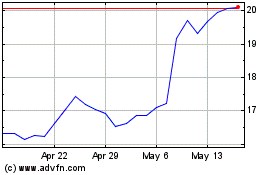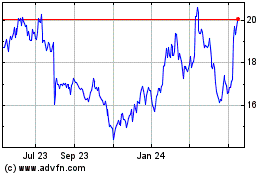Radware® (NASDAQ: RDWR), a global leader in application security
and delivery solutions for multi-cloud environments, released its
H1 2024 Global Threat Analysis Report.
“During the first half of 2024, high-intensity, volumetric
attacks surged, marked by a growing emphasis on the application
infrastructure,” said Pascal Geenens, Radware’s director of threat
intelligence. “World-wide geopolitical tensions, including
conflicts in Europe and the Middle East, as well as international
events, like country elections, Eurovision, UEFA Euro, and the
Olympics, continue to drive malicious activity. In the back half of
the year, we expect attacks to continue to climb, as more threat
actors adopt AI technology democratized through increasingly
powerful and publicly available large language models. The gravity
of the upcoming election in the United States and concerns over
decelerating financial markets are also set to fuel cyber
disruption.”
Radware’s report leverages intelligence provided by network and
application attack activity sourced from the company’s Cloud and
Managed Services and threat intelligence research team. In
addition, it draws from information found on Telegram, a public
messaging platform often used by cybercriminals.
Web DDoS attacks climb more than 200% Web DDoS
attacks made significant gains in frequency and intensity.
- Number of attacks: In the first half of 2024, Web DDoS attacks
surged globally 265% compared to the second half of 2023.
- Geographic targets: Organizations in EMEA were the primary
target of Web DDoS attacks between January and June of 2024,
shouldering more than 90% of the attacks.
Recently, Radware reported a record-breaking six-day Web DDoS
attack campaign, targeting a financial institution. It consisted of
multiple waves, which lasted 4- to 12-hours, amounting to a total
of 100 hours of attack time and sustaining an average of 4.5
million RPS with a peak of 14.7 million RPS.
Network-layer DDoS attack volumes increase
exponentially During the first half of 2024:
- Attack volume: Average DDoS volume blocked per organization
grew by 293% in EMEA, 116% in the Americas, and 302% in APAC,
compared to the same period in 2023.
- Geographic targets:
- The Americas faced 58% of global attacks and 37% of the volume,
while EMEA accounted for 23% of the attacks but mitigated 56% of
the global volume.
- The APAC region accounted for almost 19% of attacks and 7% of
the global volume.
- Industry targets: Globally, finance organizations experienced
the highest attack activity (44%), followed by healthcare (17%),
technology (10%), and government (7%).
Application-layer DNS DDoS attack activity
quadruplesBetween January and June of 2024:
- Attack activity:
- DNS DDoS attack activity quadrupled compared to the first half
of 2023.
- The number of malicious DNS queries grew by 76% compared to the
total number of queries observed during all of 2023.
- Industry targets: Finance was the most targeted industry,
representing 52% of the total Layer 7 DNS Flood attack activity.
Healthcare, telecom, and research and education were other notable
industries.
Hacktivist DDoS activity continues
unabatedDuring the first half of 2024, the hacktivist
landscape remained dynamic with constant DDoS activities. According
to data gathered from Telegram:
- Number of attacks: Hacktivist-driven DDoS attacks hovered
between 1,000 to 1,200 claimed attacks per month.
- Top actors claiming DDoS attacks: NoName057(16) remained the
most active threat actor by a significant margin, claiming 1,902
attacks, followed by Executor DDoS (577 claimed attacks) and Cyber
Army of Russia Reborn (437 claimed attacks).
- Geographic targets: Ukraine was the most targeted country with
741 claimed attacks compared to 744 attacks in all of 2023. The
United States ranked second (604 claimed attacks), followed by
Israel (542 claimed attacks), and India (364 claimed attacks).
- Website targets: Government websites were top hacktivist
targets, especially in Ukraine, Israel and India. Business and
economy followed by travel were the second and third most targeted
websites respectively.
“Following the conflict between Russia and Ukraine, Telegram has
continued to inspire many hacktivists and other ill-intended groups
to make a move for the platform,” said Geenens. “It’s become a
major hub for cyber criminals, making it easier for them to recruit
volunteers, build global alliances, create and sell attack
services, and exchange cryptocurrency.”
Web application and API attacks rise During the
first half of 2024:
- Number of attacks: Web application and API attacks increased by
22% compared to the second half of 2023.
- Geographic targets: The majority of web attacks (66%) were
targeting applications and APIs located in North America.
Applications in EMEA accounted for 23% of the attack activity.
Radware’s complete 2024 Global Threat Analysis Report can be
downloaded here.
About RadwareRadware® (NASDAQ: RDWR) is a
global leader in application security and delivery solutions for
multi-cloud environments. The company’s cloud application,
infrastructure, and API security solutions use AI-driven algorithms
for precise, hands-free, real-time protection from the most
sophisticated web, application, and DDoS attacks, API abuse, and
bad bots. Enterprises and carriers worldwide rely on Radware’s
solutions to address evolving cybersecurity challenges and protect
their brands and business operations while reducing costs. For more
information, please visit the Radware website.
Radware encourages you to join our community and follow us on:
Facebook, LinkedIn, Radware Blog, X, YouTube, and Radware Mobile
for iOS.
©2024 Radware Ltd. All rights reserved. Any Radware products and
solutions mentioned in this press release are protected by
trademarks, patents, and pending patent applications of Radware in
the U.S. and other countries. For more details, please
see: https://www.radware.com/LegalNotice/. All other
trademarks and names are property of their respective owners.
THIS PRESS RELEASE AND THE RADWARE H1 2024 GLOBAL THREAT
ANALYSIS REPORT ARE PROVIDED FOR INFORMATIONAL PURPOSES ONLY. THESE
MATERIALS ARE NOT INTENDED TO BE AN INDICATOR OF RADWARE'S BUSINESS
PERFORMANCE OR OPERATING RESULTS FOR ANY PRIOR, CURRENT, OR FUTURE
PERIOD.
Radware believes the information in this document is accurate in
all material respects as of its publication date. However, the
information is provided without any express, statutory, or implied
warranties and is subject to change without notice.
The contents of any website or hyperlinks mentioned in this
press release are for informational purposes and the contents
thereof are not part of this press release.
Safe Harbor Statement This press release
includes “forward-looking statements” within the meaning of the
Private Securities Litigation Reform Act of 1995. Any statements
made herein that are not statements of historical fact, including
statements about Radware’s plans, outlook, beliefs, or opinions,
are forward-looking statements. Generally, forward-looking
statements may be identified by words such as “believes,”
“expects,” “anticipates,” “intends,” “estimates,” “plans,” and
similar expressions or future or conditional verbs such as “will,”
“should,” “would,” “may,” and “could.” For example, when we say in
this press release that in the back half of the year, we expect
attacks to continue to climb, as more threat actors adopt AI
technology democratized through increasingly powerful and publicly
available large language models, we are using forward-looking
statements. Because such statements deal with future events, they
are subject to various risks and uncertainties, and actual results,
expressed or implied by such forward-looking statements, could
differ materially from Radware’s current forecasts and estimates.
Factors that could cause or contribute to such differences include,
but are not limited to: the impact of global economic conditions,
including as a result of the state of war declared in Israel in
October 2023 and instability in the Middle East, the war in
Ukraine, and the tensions between China and Taiwan; our dependence
on independent distributors to sell our products; our ability to
manage our anticipated growth effectively; a shortage of components
or manufacturing capacity could cause a delay in our ability to
fulfill orders or increase our manufacturing costs; our business
may be affected by sanctions, export controls, and similar
measures, targeting Russia and other countries and territories, as
well as other responses to Russia’s military conflict in Ukraine,
including indefinite suspension of operations in Russia and
dealings with Russian entities by many multi-national businesses
across a variety of industries; the ability of vendors to provide
our hardware platforms and components for the manufacture of our
products; our ability to attract, train, and retain highly
qualified personnel; intense competition in the market for cyber
security and application delivery solutions and in our industry in
general, and changes in the competitive landscape; our ability to
develop new solutions and enhance existing solutions; the impact to
our reputation and business in the event of real or perceived
shortcomings, defects, or vulnerabilities in our solutions, if our
end-users experience security breaches, if our information
technology systems and data, or those of our service providers and
other contractors, are compromised by cyber-attackers or other
malicious actors or by a critical system failure; outages,
interruptions, or delays in hosting services; the risks associated
with our global operations, such as difficulties and costs of
staffing and managing foreign operations, compliance costs arising
from host country laws or regulations, partial or total
expropriation, export duties and quotas, local tax exposure,
economic or political instability, including as a result of
insurrection, war, natural disasters, and major environmental,
climate, or public health concerns, such as the COVID-19 pandemic;
our net losses in the past two years and possibility we may incur
losses in the future; a slowdown in the growth of the cyber
security and application delivery solutions market or in the
development of the market for our cloud-based solutions; long sales
cycles for our solutions; risks and uncertainties relating to
acquisitions or other investments; risks associated with doing
business in countries with a history of corruption or with foreign
governments; changes in foreign currency exchange rates; risks
associated with undetected defects or errors in our products; our
ability to protect our proprietary technology; intellectual
property infringement claims made by third parties; laws,
regulations, and industry standards affecting our business;
compliance with open source and third-party licenses; and other
factors and risks over which we may have little or no control. This
list is intended to identify only certain of the principal factors
that could cause actual results to differ. For a more detailed
description of the risks and uncertainties affecting Radware, refer
to Radware’s Annual Report on Form 20-F, filed with the Securities
and Exchange Commission (SEC), and the other risk factors discussed
from time to time by Radware in reports filed with, or furnished
to, the SEC. Forward-looking statements speak only as of the date
on which they are made and, except as required by applicable law,
Radware undertakes no commitment to revise or update any
forward-looking statement in order to reflect events or
circumstances after the date any such statement is made. Radware’s
public filings are available from the SEC’s website at www.sec.gov
or may be obtained on Radware’s website at www.radware.com.
RADWARE (NASDAQ:RDWR)
Historical Stock Chart
From Oct 2024 to Nov 2024

RADWARE (NASDAQ:RDWR)
Historical Stock Chart
From Nov 2023 to Nov 2024
